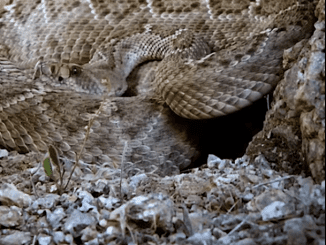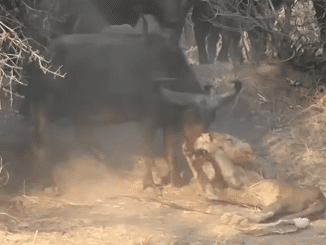Lions, known as the “king of beasts,” are not only symbols of strength and courage, but also highly social animals that live in prides and cooperate to survive. However, in the wild, internal conflicts between male lions are not uncommon, and they often lead to fierce battles with serious consequences. Recently, an incident has attracted attention from scientists and the animal-loving community when a male lion bit his own kind in a territorial dispute.


- Causes of conflicts between male lions
Battles between male lions in the wild often originate from the struggle for control of territory and female prides. In a pride of lions, males play an important role in protection and leadership, so male lions are often highly competitive to maintain or gain power. This competition is even more intense when adult males from other places appear or when young males rise up to take over the pride. - Uncompromising confrontation
When two male lions decide to confront each other, the battle is often fierce and brutal. Lions use their fangs and claws to bite and attack their opponents to weaken them and gain dominance. In a recent conflict in a wildlife reserve in Africa, a male lion bit the neck and body of another male, causing serious injuries. Scientists believe that this fierce attack was not only a matter of territory, but also because of a dispute over females in the pride.
Male lions often do not hesitate to bite or attack other lions, and serious injuries can lead to death if not treated promptly. These fights usually only end when one of the two is completely defeated or chased away from the territory.


- Consequences of internal fights
The consequences of fights between male lions can have long-term effects on the pride. If a male is defeated or injured, the pride may lose an important protector. In fact, the disappearance of the dominant male can lead to the invasion of other males, putting the pride’s females and cubs at risk of being killed to avoid future competition.
In addition, researchers have found that these fights can cause stress and anxiety in the pride, affecting the hunting behavior and survival of the pride. Female lions may have to shoulder the responsibility of protecting their offspring and finding food while the male is injured.
- Explanation from an ecological and evolutionary perspective
From an ecological and evolutionary perspective, these fights are part of the natural law to maintain a strong and best adapted breed to the environment. Male lions may fight to protect their genes and ensure that only the strongest individuals can reproduce and pass on their traits to the next generation. This explains why young males often challenge older males for power.



- The role of humans in protecting and studying lions
Although fights between male lions are natural, human intervention in some reserves can help reduce their intensity. Researchers have observed and recorded lion behavior to better understand the causes and consequences of these fights. This not only helps protect lions, but also helps maintain ecological balance in nature.
Conclusion
Wildlife is always full of fierce battles for survival and the maintenance of the species. Fights between male lions are a testament to the strength, resilience and survival instinct of this animal species. While these battles may seem brutal to us, they are an integral part of the natural world, helping to maintain a balanced ecosystem and promote natural evolution.


